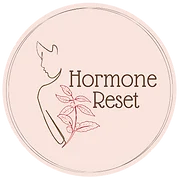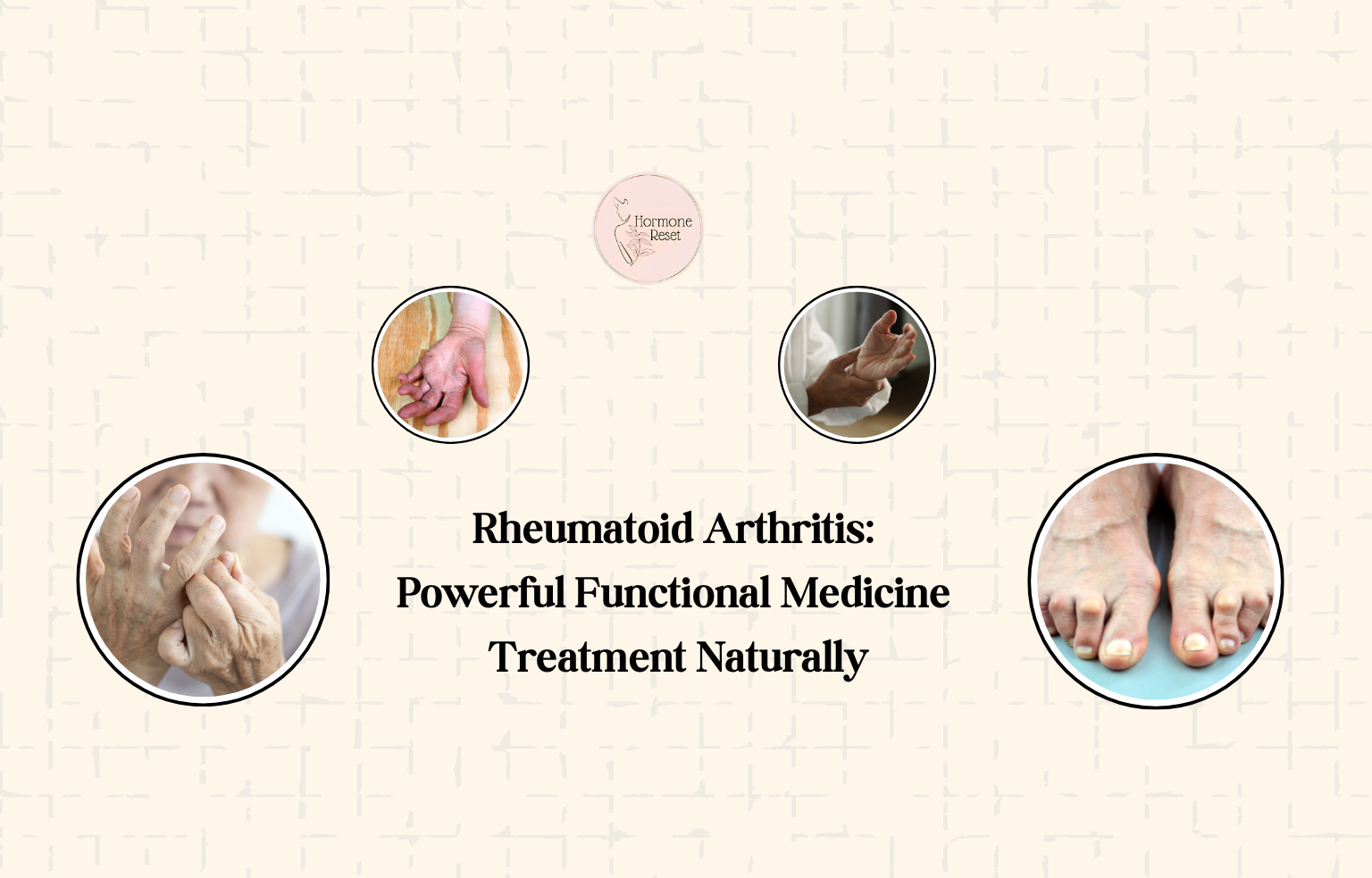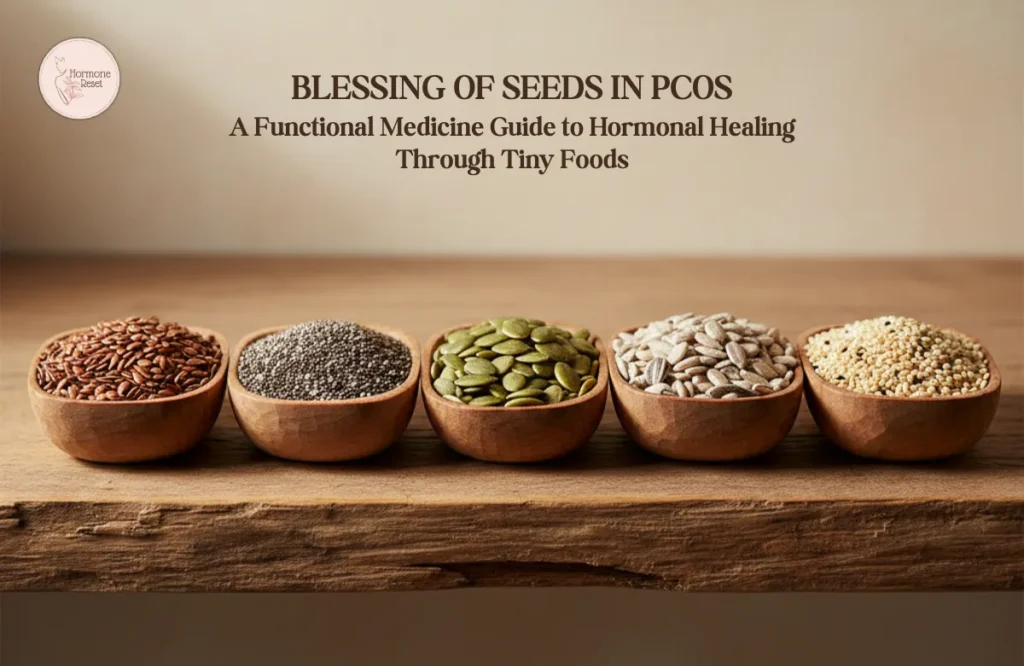Rheumatoid Arthritis (RA) is more than just joint pain. It’s an autoimmune condition where the body mistakenly attacks its own tissues, leading to chronic inflammation, pain, and joint damage. But what if the root cause of RA isn’t just genetics or lifestyle? What if along with other factors, hormones play a critical role in triggering and sustaining this disease?
Recent research and integrative approaches, like those at Hormone Reset, show that balancing hormones is a game-changer in treating RA. Functional medicine takes a deep dive into how hormonal imbalances, gut health, and lifestyle factors influence autoimmune diseases, offering a root-cause solution rather than just symptom management.
The Science Behind Rheumatoid Arthritis and Autoimmune Dysfunction
Rheumatoid Arthritis is classified as an autoimmune disorder, meaning the body’s immune system mistakenly attacks healthy tissues. Several key factors contribute to this dysfunction:
- Genetic Predisposition: Some individuals are more susceptible to autoimmune conditions due to their genetic makeup.
- Environmental Triggers: Toxins, infections, and even unsuitable diet can activate an autoimmune response.
- Chronic Inflammation: Persistent inflammation leads to tissue damage and worsens RA symptoms.
- Cortisol Imbalance: Chronic stress leads to excess cortisol, which disrupts the immune system and increases inflammation.
- Estrogen Dominance: High estrogen levels can overstimulate the immune system, increasing RA risk.
- Thyroid Dysfunction: Hypothyroidism and Hashimoto’s thyroiditis are linked to RA, as they both fuel systemic inflammation.
- Insulin Resistance: Blood sugar imbalances can worsen inflammation and joint damage.
By addressing these triggers, functional medicine provides a holistic approach to healing rather than just suppressing and masking symptoms.
How Hormones Influence Rheumatoid Arthritis Development?
Many Rheumatoid Arthritis patients, especially women, experience symptom fluctuations related to hormonal changes. Why? Because hormones regulate immune responses, inflammation, and cellular function. Here’s how hormones impact RA:
Estrogen & Progesterone: The Immune Regulators
- Women are three times more likely to develop Rheumatoid Arthritis than men, often experiencing symptom flare-ups during pregnancy, postpartum, or menopause.
- Estrogen and progesterone have anti-inflammatory properties, but their imbalances can trigger immune dysfunction and increase inflammation.
- Low estrogen levels, especially post-menopause, contribute to increased inflammation and joint degeneration.
Cortisol: The Stress-Induced Firestarter
- Chronic stress elevates cortisol, a stress hormone that, when dysregulated, weakens the immune system and fuels inflammatory cytokines, worsening RA symptoms.
- Chronic stress can also lead to Adrenal dysfunction that leads to an inability to regulate inflammation effectively, making flares more severe and frequent.
Thyroid Hormones: The Overlooked Factor
- Thyroid dysfunction is highly correlated with RA, as both aid to low immunity.
- Hypothyroidism (low thyroid function) slows down metabolism, weakens the immune system, and promotes joint stiffness and fatigue.
Insulin Resistance & Blood Sugar Spikes
- High insulin and unstable blood sugar levels drive systemic inflammation, worsening Rheumatoid Arthritis symptoms.
- Conversely, RA patients often exhibit higher insulin resistance, making dietary and lifestyle changes crucial in treatment.
The Functional Medicine Approach to Rheumatoid Arthritis Healing

Unlike conventional medicine, which primarily treats symptoms with medications, functional medicine digs deeper to uncover underlying triggers. Here’s how it differs:
| Conventional Medicine | Functional Medicine |
| Focuses on symptom relief with painkillers and immunosuppressants | Identifies root causes like gut health, toxins, and nutrient deficiencies |
| Often leads to side effects and long-term dependence on medications | Uses natural interventions to support the body’s healing mechanisms |
| Ignores the role of diet and lifestyle | Prioritizes nutrition, lifestyle changes, and personalized treatment |
Identifying the Root Causes of Rheumatoid Arthritis
Unlike conventional medicine, which primarily focuses on symptom suppression, a functional medicine approach seeks to uncover the deeper triggers of Rheumatoid Arthritis. This involves:
- Advanced Hormone Testing to detect imbalances in estrogen, progesterone, cortisol, thyroid hormones, and insulin.
- Inflammation Marker Analysis (CRP, ESR) to assess the severity of autoimmune activity.
- Nutrition Status Assessment helps understand if low levels of key nutrients like vitamins a, b12 and d, omega 3 fatty acids, zinc, etc. are causing or worsening the disease dynamics.
- Gut Health Assessment to identify leaky gut syndrome and dysbiosis etc, which often triggers autoimmune conditions.
- Environmental Toxicity Exposure Screening to evaluate toxins, heavy metals, and pollutants affecting immune function.
- Genetic Testing to assess predispositions and guide personalised interventions.
By understanding these factors, a targeted healing strategy can be developed.
The Role of Gut Health in Rheumatoid Arthritis
Gut health plays a crucial role in autoimmune conditions like Rheumatoid Arthritis. The gut microbiome regulates the immune system, and imbalances can lead to chronic inflammation and autoimmunity.
Leaky Gut Syndrome and Rheumatoid Arthritis
- Increased intestinal permeability—often referred to as “leaky gut”—allows harmful toxins, microbes, and undigested food particles to pass through the gut lining and enter the bloodstream. This triggers an immune response, causing the body to attack these foreign invaders and inadvertently inflame its own tissues.
- Multiple studies have found that individuals with RA commonly experience gut dysbiosis, a state where the balance of good and bad bacteria in the gut is disrupted. This imbalance contributes to ongoing systemic inflammation and worsens autoimmune reactions. Moreover, certain gut bacteria such as Prevotella copri have been associated with increased RA risk, reinforcing the gut-joint connection in autoimmunity.
- Low levels of beneficial microbes like Bifidobacteria and Lactobacilli have also been noted in RA patients, further aggravating immune dysfunction and gut barrier weakness.
- Gut infections and overgrowth of pathogens such as Candida albicans may also contribute to heightened immune activation in RA.
Healing the Gut for Rheumatoid Arthritis Relief
- Probiotics & Fermented Foods: Support a healthy microbiome with yogurt (dahi), kefir, sauerkraut, and kombucha. These foods help reintroduce beneficial bacteria into the digestive tract, which may improve immune regulation.
- Bone Broth & Collagen: Contain amino acids like glycine and proline that help repair the intestinal lining, reduce systemic inflammation, and support joint health.
- Eliminating Food Triggers: Gluten (gehun), dairy (doodh and milk-based products), and processed foods can damage the intestinal barrier, increase gut permeability (leaky gut), and initiate autoimmune flares. An elimination diet may provide clarity and relief.
- Prebiotics & Fiber: Feed beneficial bacteria and support gut barrier function. Rich sources include garlic (lehsun), onions (pyaaz), leeks (hara pyaaz), bananas (kela), asparagus (shatavari), and chicory root.
- Herbal Support: Supplements such as slippery elm, marshmallow root, and licorice root (mulethi) have mucilaginous properties that coat and soothe the gut lining, reduce inflammation, and promote healing of the GI tract.
The Rheumatoid Arthritis Connection Between Toxins and Autoimmune Disorders
How Environmental Toxins Trigger Rheumatoid Arthritis
- Heavy metals like mercury, aluminium and lead can disrupt immune function.
- Pesticides and chemicals in food can contribute to autoimmune flare-ups.
- Plastics and endocrine-disrupting chemicals interfere with hormonal balance, fueling inflammation.
Reducing Toxin Exposure for Rheumatoid Arthritis Relief
- Choose organic foods whenever possible.
- Filter drinking water to remove contaminants.
- Reduce plastic use and switch to glass or stainless steel containers.
- Opt for natural personal care and cleaning products.
Natural Strategies for Managing Rheumatoid Arthritis
Addressing Rheumatoid Arthritis effectively requires a multi-faceted approach that restores balance to the body. Here are some proven strategies:
Nutritional and Dietary Adjustments

- Anti-Inflammatory Diet: Include omega-3-rich foods like fatty fish (salmon, sardines), flaxseeds (alsi), and walnuts (akhrot). Add anti-inflammatory spices such as turmeric (haldi) and ginger (adrak), and eat plenty of leafy greens like spinach (palak), fenugreek leaves (methi), and amaranth (chaulai). These Anti-Inflammatory foods help lower inflammation markers and support joint health.
- Blood Sugar Stabilization: Avoid sugary snacks, white bread (safed double roti), and soft drinks. Focus on complex carbohydrates such as brown rice (bhura chawal), millet (bajra, jowar), sweet potatoes (shakarkand), and legumes (rajma, chana). These help prevent blood sugar spikes, reducing insulin-driven inflammation.
- Gut Health Restoration: Strengthen digestion with fermented foods like yogurt (dahi), buttermilk (chaas), and pickled vegetables (achar). Bone broth (yakhni) and collagen support gut lining repair. Fiber-rich foods like oats (jai), fruits (seb, papita), and vegetables (gajar, lauki) feed beneficial bacteria and enhance detoxification.
- Hydration & Detoxification: Drink at least 2–3 liters of water daily. Add herbal teas like tulsi, mint (pudina), or cumin (jeera) water to support kidney and liver detox pathways. Hydration improves lymphatic flow and reduces joint stiffness.
Lifestyle Modifications
- Stress Management: Use mindfulness, meditation, and deep breathing exercises to regulate cortisol and reduce chronic stress, a key factor in RA flare-ups. You can use different apps for guided practices.
- Physical Activity: Engage in low-impact workouts like yoga (especially restorative and yin yoga), tai chi, and gentle strength training to improve joint flexibility, reduce stiffness, and enhance blood circulation.
- Quality Sleep: Prioritize 7–9 hours of deep, restorative sleep. Use sleep hygiene strategies like maintaining a consistent bedtime, limiting screen time, and using magnesium supplements or herbal teas (like chamomile or ashwagandha) to improve sleep quality.
- Sunlight & Vitamin D: Aim for 15–20 minutes of early morning sun exposure daily to boost natural vitamin D production, which supports immune regulation and bone mineral density. If deficient, consider supplementation under medical supervision.
- Community & Emotional Wellbeing: Join support groups, engage in hobbies, or volunteer. Strong social bonds and emotional expression (like journaling or therapy) lower cortisol levels and enhance the body’s healing capacity, especially in chronic inflammatory conditions like RA.
A New Era of Rheumatoid Arthritis Healing Through Functional Medicine
Rheumatoid Arthritis is a complex condition, but functional medicine offers hope for long-term healing. By identifying hormonal imbalances, gut dysfunction, and environmental triggers, this approach provides a path to recovery beyond just medication.
Healing is possible when we address the root cause, not just the symptoms. With the right hormone reset, dietary interventions, detoxification strategies, and lifestyle changes, you can regain control over your health and live pain-free.
Are You Ready to Take Control of Your Rheumatoid Arthritis Naturally?
Connect with Hormone Reset today to get a personalised plan that restores hormonal balance, reduces inflammation, and gives you back your quality of life.
Further if you’re looking for one-on-one consultation with our Specialists, then Book Now!
References
- Comprehensive RA Treatment Overview: Integrative Approaches to Testing and Treatment of Rheumatoid Arthritis
- Functional Medicine Perspective on Arthritis: Functional Medicine for Arthritis
- RA and Functional Medicine Approaches: Rheumatoid Arthritis & Functional Medicine
- Scientific Research on RA: Research on RA – PubMed Central
- Advanced Functional Medicine Strategies for RA: Advanced Functional Medicine & RA
- Nutritional Interventions for RA: Nutritional Approaches to RA
Conventional Medical Perspective on Rheumatoid Arthritis: Cleveland Clinic – RA Overview





Leave a Reply